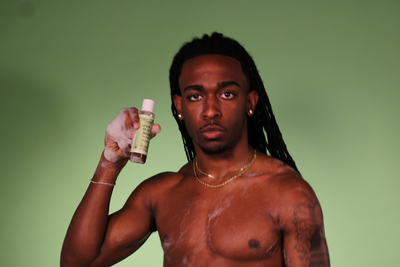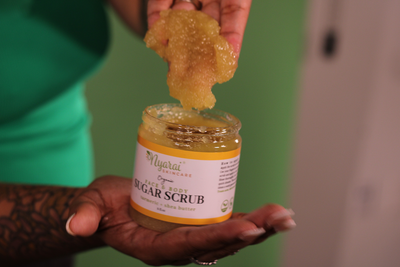You notice it one morning while getting ready, a tiny dark patch on your cheek. At first, it doesn’t bother you. But weeks later, it’s still there, a little more stubborn, maybe joined by a few more. Suddenly, every mirror, every selfie, seems to highlight those spots you wish would fade away.
That’s when the skincare hunt begins. You find yourself torn between two very different worlds: the natural side, with its plant-based oils, turmeric masks, and vitamin-rich serums; and the chemical side, where dermatologist-recommended formulas with hydroquinone, retinoids, and acids promise fast, visible results.
Both camps claim victory in the fight against dark spots, but how do you know which one is right for your skin?
In this blog, we’ll break down the real differences between natural and chemical dark spot removers, explore their pros and cons, and help you make a choice that aligns with your skin goals (and your lifestyle).
Understanding Dark Spots & Hyperpigmentation
Before we jump into treatments, let’s get to the root of the problem: why do dark spots even show up?
Dark spots, also called hyperpigmentation, happen when your skin produces extra melanin (the pigment that gives skin its color). Think of it as your skin hitting the “overachiever” mode in certain areas. The result? Patches or spots that look darker than the rest of your skin tone.
Most common causes include:
-
Sun exposure – UV rays trigger melanin production as protection, but too much leads to spots.
-
Post-acne marks – breakouts may heal, but they often leave behind stubborn reminders.
-
Aging – as skin matures, cell turnover slows down, making discoloration more noticeable.
-
Hormonal changes – pregnancy, birth control, or hormonal imbalances can lead to melasma (a type of hyperpigmentation).
While dark spots aren’t harmful, they can feel frustrating, especially when they stick around long after the breakout or sunburn is gone. The good news is with the right routine, they can fade away and restore an even skin tone.
Natural Treatments for Dark Spots
If you’re the type who likes to peek into the kitchen before hitting the pharmacy, natural remedies might feel more your style. They’re gentle, budget-friendly, and often double as skincare and self-care. But like most natural things, they usually take patience.
Popular natural options include:
-
Lemon juice (Vitamin C boost) – Known for its brightening properties, but can be harsh if used raw. Always dilute it and patch-test first.
-
Turmeric – A powerhouse anti-inflammatory and antioxidant that helps reduce dark spots, pigmentation, and gives skin a natural glow.
-
Aloe vera gel – Calms skin and slowly fades post-acne marks with regular use.
-
Apple cider vinegar – Contains acetic acid, which may lighten spots, but it needs to be used sparingly to avoid irritation.
-
Honey & turmeric mask – Turmeric helps reduce pigmentation, while honey soothes and hydrates.
-
Green tea extract – Contains antioxidants that fight free radicals and help prevent further darkening.
And if DIY isn’t your thing, you can still go all-natural without turning your kitchen into a lab.
That’s where Nyarai’s organic products come in, like the
combines plant-based formulations designed to target both breakouts and the marks they leave behind. It’s not just about fading spots, it supports the skin’s overall health, helping it stay clear, hydrated, and balanced.
Also, African Black Soap, packed with shea butter and cocoa pods, or the natural oils and scrubs that combine these age-old remedies into ready-to-use formulas. They’re designed to give you the benefits of traditional ingredients, minus the mess and guesswork.
The beauty of natural treatments is that they often work in harmony with your skin, making them ideal for people with sensitive skin or those who prefer a vegan, cruelty-free routine.
The catch is that natural remedies (whether DIY or product-based) often work best for mild, surface-level dark spots and require consistency like for a few weeks to months. They’re less likely to deliver dramatic overnight results compared to stronger treatments, but if your skin is sensitive or you want to avoid chemicals, these remedies and organic products from Nyarai, can be a safe and soothing place to start.
Chemical Treatments: The Fast-Track Option
On the flip side, chemical treatments are like the “power tools” of skincare. They often work faster than natural remedies but can come with strings attached. Common options include:
-
Hydroquinone – a strong skin-lightening agent that can fade dark spots quickly but isn’t always suitable for long-term use.
-
Retinoids – vitamin A derivatives that speed up cell turnover, helping spots fade while also smoothing fine lines.
-
Chemical peels – treatments using acids like glycolic or salicylic to exfoliate deeper layers of the skin.
While these can be highly effective, they’re not for everyone. Sensitive skin may react with redness, peeling, or irritation. And in some cases, misuse of strong chemicals can leave the skin more damaged than before.
That’s why dermatologists usually recommend chemical treatments for stubborn, deep-seated pigmentation but they always emphasize proper guidance and moderation.
Natural vs. Chemical Skincare: Which Is Right for You?
Confused between natural skincare and chemical treatments? Here’s a quick comparison to see the benefits and drawbacks of both.
Conclusion: Finding Your Perfect Dark Spot Solution
Dark spots can be stubborn, but the good news is there’s a solution for every skin type and lifestyle. If you prefer a gentle, nourishing approach and have sensitive skin, natural treatments, if it's DIY or organic products like Nyarai’s Body Acne & Dark Spot Kit, can gradually restore an even skin tone while keeping your skin healthy and balanced.
On the other hand, if you’re looking for faster results or battling deep pigmentation, chemical treatments under professional guidance can be effective, but they require careful use.
Ultimately, the best dark spot remover is the one that suits your skin, fits your routine, and feels right for you. Consistency, patience, and a little self-care go a long way, because glowing, even-toned skin isn’t just about what you put on it; it’s also about treating your skin with love and respect.





